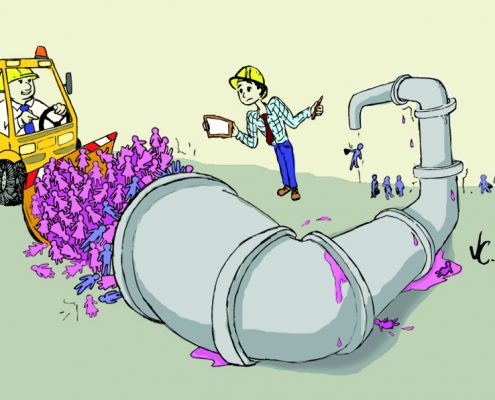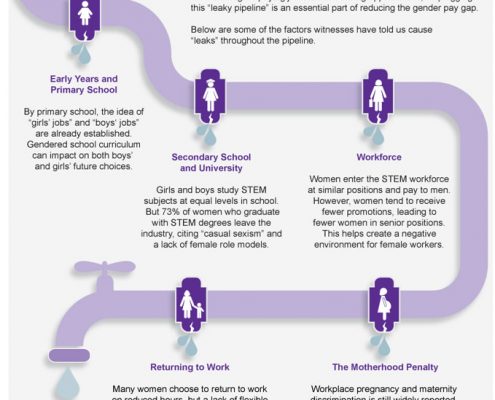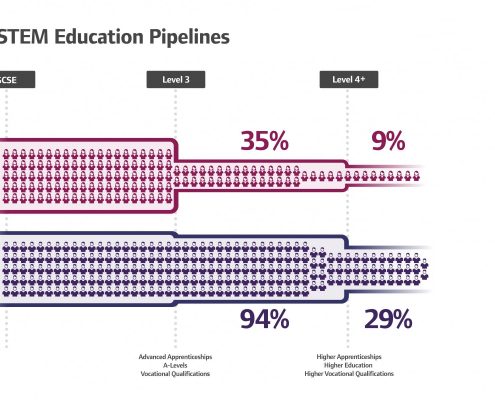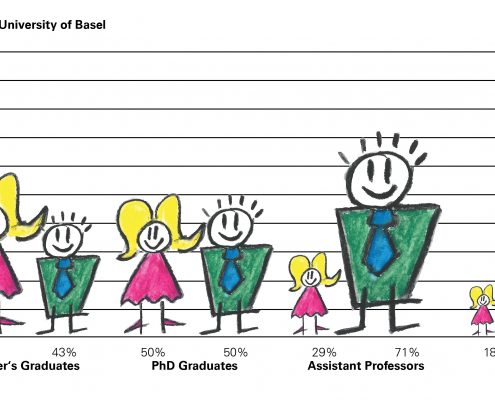Leaky pipeline or drip irrigation system
The leaky pipeline is a recurring metaphor in discussions about the gender balance in Science (especially physical sciences), Technology, Engineering and Maths (collectively, ‘STEM’). Whether the field under discussion is academic or industrial, there is widespread concern about the fact that many of those who start in the field do not stay in the field in the longer term.
Images of a pipeline, with leaks, are regularly produced which show the percentage of women at different stages, and in different disciplines. Alongside the images are headlines about ‘Plugging the leaks’, ‘Why women leave…’ and ‘Where have all the women gone?’
This is a very negative narrative. Somehow, the lack of diversity in a range of fields is the fault of the people leaving, and not the fields themselves. If only the women (or people of colour, or low socioeconomic status) realised that they were part of a leaking pipeline, maybe they’d stay and everything would be alright.
The leaky pipeline metaphor implies that leaving the pipeline is wasteful, and a poor choice (on the part of the people in question). However, is that really the case?
Is the problem with the people or the subject?
In 2006 the Institute of Physics published ‘Girls in the Physics Classroom: a review of the research on girls’ participation in physics‘ and ‘Girls in the Physics Classroom: a teachers guide for action.’ In many ways, this work was focussed on how to make the physics classroom more appealing to girls, and to identify how to teach girls so that they liked physics.
Over time IOP has used analysis of the National Pupil Database to show that there are whole school effects around the take-up of physics by girls and boys. The report ‘It’s different for girls‘ looked at the differences in Physics uptake as a function of type of school, and ‘Closing doors‘ looked at the gender balance for a range of subjects.
It would seem that uptake of A-level physics (and by extension other STEM subjects) is not a problem for 13-16 year old girls to solve, but rather is mediated by whole school, and even societal, issues.
On a wider scale, I would argue that rather than trying to change girls and make them choose STEM subjects, the onus is on the different STEM industries to change so that girls (and others) want to work there.
Are the people leaving ‘going to waste’?
The implication from many of the articles around the leaky STEM pipeline is that those people that leave the pipeline are wasting their training and their talents. Perhaps, from the point of view of an engineering company, an engineering graduate who becomes a physics or maths teacher is a waste. They have dripped out of the pipeline, and represent a net loss. Maybe, from the point of view of a university, the chemistry graduate who becomes a science communicator, or an MP, is a waste. Every A-level physics student who goes on to study law or music is another physicist lost from the pipeline.
But are they wasted? Or do they take the ways of thinking and understanding of the world gained from studying STEM (to whatever level), and use them in other fields of knowledge?
Changing the metaphor
What if, instead of thinking in terms of leaking pipelines, we thought about drip irrigation systems?
A drip irrigation system is a series of pipes which direct water and nutrients to plants where they are needed, and then release the water. In ‘leaking,’ the irrigation system makes its environment better.
Society needs people at all levels and in a range of different disciplines who are comfortable with STEM and see its value, not necessarily working in STEM. Maybe we should think of the drip irrigation STEM system – improving society as those with STEM training permeate throughout it.
At a recent STEM in Schools conference, Yvonne Baker (STEM Learning) talked about the need to consider a longer game. Maybe students don’t go into STEM, or maybe they leave STEM to follow another career path. But, perhaps when their children, or friends’ children talk about wanting to become engineers, physicists or computer programmers, they would encourage those career choices.
Rather than making people feel like they’ve failed if they don’t make it to the bucket at the end of the pipeline, let’s encourage them to irrigate and improve wherever they go to.
Let’s change the metaphor.





